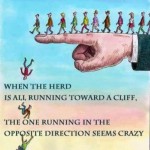 A few years ago Seth Godin popularized a video of the dancing guy at the Sasquatch music festival. I’m sure you’ve seen it, but on the off chance you haven’t, it shows a guy dancing at a music festival. Whilst he initially dances on his own, he’s shortly joined by a fellow reveler, and then another one, and before you know it, there are hundreds of people dancing alongside this guy.
A few years ago Seth Godin popularized a video of the dancing guy at the Sasquatch music festival. I’m sure you’ve seen it, but on the off chance you haven’t, it shows a guy dancing at a music festival. Whilst he initially dances on his own, he’s shortly joined by a fellow reveler, and then another one, and before you know it, there are hundreds of people dancing alongside this guy.
Godin, and indeed many since him, have often used this video as an example of how you can create a movement and so on, and the clip is used as a creative construct.
The flipside of course is that it’s a great example of herd like behavior, and the people rushing in are exhibiting classic symptoms of groupthink.
We don’t tend to think of groupthink as a positive thing when it comes to innovation. Indeed, it’s often remarked upon as the principle barrier to innovation, as employees huddle around the status quo.
A new study from researchers at the University of Exeter underlines the difficulties of overcoming this. It goes as far as to suggest that herd like behavior is hardwired into us as human beings.
The study suggests that when we form our opinions, we tend to be overwhelmingly influenced by those around us rather than forming opinions for ourselves.
This then causes us, both as individuals and collectively, to become much less responses to the changes occurring in our environment. As you can imagine, if you want to become a sense and respond style of organization, that’s far from ideal.
“Social influence is a powerful force in nature and society,” the researchers say. “Copying what other individuals do can be useful in many situations, such as what kind of phone to buy, or for animals, which way to move or whether a situation is dangerous.”
“However, the challenge is in evaluating personal beliefs when they contradict what others are doing. We showed that evolution will lead individuals to over use social information, and copy others too much than they should.”
“The result is that groups evolve to be unresponsive to changes in their environment and spend too much time copying one another, and not making their own decisions. “
The researchers came to their conclusion by exploring how social information flowed throughout groups.
They used a mathematical model to show that we tend to rely excessively on the information coming from our peers rather than from more independent sources. The authors suggest this could be down to the evolutionary conflict between what is good for us as individuals, and what is good for the herd as a collective.
The researchers paint a rather gloomy prognosis when it comes to innovation. They suggest that we shouldn’t expect employees to respond particularly effective to the changing nature of their environment, for they are likely to be spending so much time copying what their peers do to even notice any such changes.
A little harsh perhaps, or does that picture accurately reflect how most people tend to behave at work?
I suppose the key is to use the herd for positive change, but as most people are behaving the way they always have done, that's not very easy to do.
It was common to man that we tend to rely most of our decision based on our peer or group opinion.